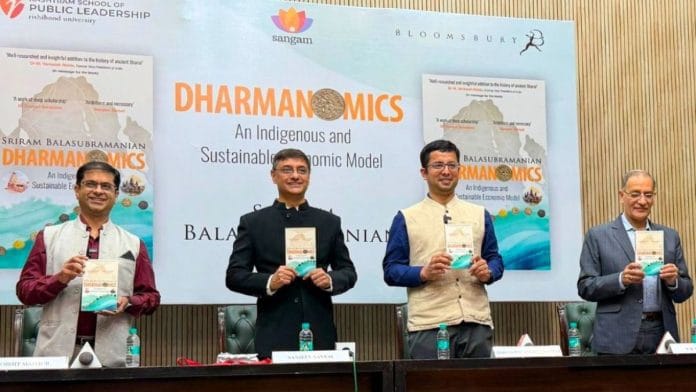New Delhi: economists who haven’t studied history and historians who haven’t studied economics don’t understand either of those subjects. With this declaration, Sanjeev Sanyal set the stage for the launch of economist Sriram Balasubramanian’s latest book, Dharmanomics.
At its core, the book proposes an economic framework based on the Indian philosophy of dharma, which guided early Indian civilisations.
“Economics is a science that deals with people and the choices they make. Whether it’s now or 5,000 years back, we are still human beings,” said Balasubramanian in conversation with Sanyal, a member of the Economic Advisory Council of the prime minister, and VK Malhotra, president of Indian Economic Association. He explored India’s rich economic history and made the case for why it was important to learn from it for the future.
The venue for the event—the Constitution Club of India—embodied this fusion of the past and the present to inform the future. The building’s exterior with its colonial-era columns, wide veranda and red sandstone was in contrast to the inside where a swanky new ice cream shop sits diagonally opposite the club’s fully air-conditioned restaurant, aptly called ‘Article 21’. This juxtaposition of British-era architecture and modern facilities provided the perfect setting for the launch of ‘Dharmanomics.’
“All great civilisations have created certain anchors for thinking about the world. I am not making the case that everything has got to be purely indigenous and we should go back to the beginning,” said Sanyal, making the case for understanding the world in all its complexity, not just in silos.
Also read: How was British rule in Ireland and India different? Conversation between coloniser and colonised
Nyay isn’t justice
Modern critical thought is against building economic principles from India’s past. “But it is important to understand the course by which we came to understand ourselves,” said Sanyal. Even modern terms like property rights and justice need to be understood through a cultural lens.
By way of example, Sanyal treated the crowd to an interesting mistranslation of the word ‘nyay’.
“It’s translated today as ‘justice’, but it actually relates to the process of reasoning,” said Sanyal. “When you say he has been given ‘nyay’, it means he has been given due process, not justice. But due process means truth.”
According to Sanyal, the process of ‘nyay’ is very different from the concept of justice we as Indians have. This is the source of the problem Indians have with their judicial system.
“We do not distinguish between justice and process. Understanding your cultural context is very important to understand why we do what we do,” said Sanyal.
Also read: IAS officer-turned-politician KJ Alphons now a self-help guru. ‘Your hurters are your helpers’
A history of trade
All three speakers gave colourful examples of India’s trading activity as evidence of its position as “the biggest and most prosperous country in the world” during ancient times.
“A full one-third of the Roman Empire’s revenues came from import tariffs on Indian goods. Hundreds of ships used to go out and come in,” said Sanyal. “And this was only on the west coast toward Rome.”
All of this trade was happening through corporatised guilds. These included manufacturing, artisanal and merchant guilds.
Some of them even had their own navy.
“In some ways, we had an ‘East India Company’ of our own,” said Sanyal, who elaborated on the power held by these guilds. There were also temple guilds that financed the trade of goods.
“Most of the big temples are all an hour’s drive away from the coast,” said Balasubramanian.
Proximity to the coast allowed temple guilds to function as venture capitalists of sorts.
“If you take the wealth in Padmanabhaswamy temple, it’s almost equivalent to the GDP of many countries today,” said Balasubramanian, before underscoring just how prevalent trade was in ancient India. The second biggest discovery of Roman coins after Europe was found in Southern India, he said.
Balasubramanian, on realising that the history lesson was taking away from the book’s purpose of also contextualising the present, made some observations about the current business environment in India.
“Even when Mukesh Ambani was talking to Jensen Huang [NVIDIA CEO], he discussed how Diwali is a new year and that’s when he starts projects,” said Balasubramanian.
From the richest person to the common man on the street, the connecting thread is Dharma-based economic frameworks.
“A lot of the East Asians look at their own past to derive inspiration and I think we should also move in that direction,” said Balasubramanian.
The Chinese Academy of Social Sciences (CASS), a state research institute, researches historical economic policies. In South Korea, the Korea Development Institute (KDI) regularly publishes reports that study the impact of policies throughout the country’s history.
The book launch was sponsored by the Rashtram School of Public Leadership at Rishihood University, Sonipat, which has an economic history course as part of the curriculum.
Professor Shobhit Mathur, a Vice-Chancellor of Rishihood and moderator for the discussion, opened the floor to questions. The audience was filled with the university’s students, who had taken late evening buses from Sonipat to attend the launch.
“How is Dharmanomics different from the Western principles?” asked a nervous, young student.
“Don’t get too tied up in the principles. When you read the Arthashastra, it has traffic rules for bullock carts. That doesn’t mean we try to implement them today,” responded Balasubramanian.
(Edited by Theres Sudeep)






